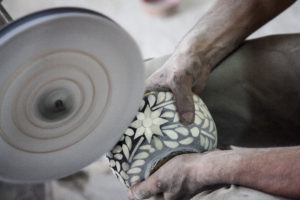The reality of fund-raising for those seeking ‘patient capital’ has proven more elusive than the current optimistic narrative about impact investing would suggest, and it begs the question: can capital really be patient?
The unstated mission of patient capital is to alter capitalism’s preoccupation for a timely financial return in favour of a longer-term profitability horizon that enables nascent organisations to develop transformative, innovative products, and/or services in emerging or frontier markets.

Artisan polishing bone inlay piece for Mela Artisans (Moradabad, India). Image credit: Mela Artisans.
However, while the social entrepreneurship and impact investing space has seen an exponential growth in the last decade, the ecosystem needs further expansion and adjustment to ensure that innovators taking risks in new markets are not asphyxiated through a lack of capital of the right kind, and that the predominant narrative actually reflects the reality of their experience.
Timely capital is what the sector needs.
The bottlenecks
There are a number of systemic bottlenecks faced by time-pressured social innovators which need new thinking and solutions.
The first one faced by social entrepreneurs and potential change-makers is their ability to find the right type of investor, one in tune with the sector, geography, type of capital, time of development, and level of engagement required for a new venture to succeed. This seems straightforward enough but, in reality, very few current platforms enable this kind of search.
The second bottleneck is generally a long and clumsy due diligence process. While checklists are numerous, and requests for further documents incessant, only a small number of investors conduct field visits to understand the reality on the ground, and those who do rarely share their knowledge or learning, so the process of allocation remains surprisingly time-consuming, repetitive and inefficient.
There is also a coherence conundrum. After an investment, funders generally become part of a governance structure and are required to make, or endorse, important decisions on further funding, expansion, strategic partnership, or direction. Contradictions often emerge if the leadership is not clear on its mission and reporting, and if board members are not united in their collective vision of impact.
And finally, there is often a pressure to re-engineer profitability. As investors become disinterested by the lack of a sufficiently early return, social entrepreneurs are often caught in an absurd scenario where, to demonstrate profitability faster, they may have to charge more for their services or products and risk ‘leaving behind’ their original focus on the under-served.
What appears to be needed is a fundamental correction of the current ecosystem, and of its assumptions, and, in turn, the human intentions of those who lead and deploy capital.
Efficient, ready-to-deploy, catalytic capital
Large, flexible, ‘catalytic funds’ need to emerge to enable higher volumes of less risk-averse funding, for larger rounds to be deployed at once, with a decade-long horizon view, and perhaps embed financial incentives such as share of revenues along the way. Equally important, these funds should be ready to deploy capital for emergency funding, such as COVID-19, allowing both urgency and collaboration on the back of outcomes validated directly by the people they are meant to serve.
Data-driven, technology-enabled, value aligned growth and impact
Using technology for search, due diligence, and investor-matching, for tracking overall impact performance, and demonstrating readiness to receive emergency capital, would increase the actual impact of the ecosystem, and deliver a data-driven evidence-based approach. The sector needs to transcend the obvious problems of working in competitive silos. The technology exists to do this, though incentives to use it are patchy at best because the benefit to users in a fragmented social capital market are as yet unclear.
And perhaps over time, the financial return and the social return will cease to be seen as dichotomous; when the former is a practical function of the latter, our overriding Gestalt will shift.
‘Timely capital’ connects with the reality of social entrepreneurs and the unique markets they work to serve – and who, it seems, appear to be holding a key to our global common good. Now, at a moment in which every human’s wellbeing is a function of the behaviour of every other human around them, it would seem, is a good time to serve and preserve it.
Farahnaz Karim is the founder of Insaan Group. Audrey Selian is the co-founder of Artha Networks and ImpactforBreakfast.com.





Comments (0)